For International Women’s Day this year, members of the Independent staff sat down with Denya LeVine of WOMR for a roundtable discussion about women and music. You can tune in and listen to the broadcast on March 8. In the meantime, enjoy the songs they selected for this edition of the Indie Playlist, which you can also find on Spotify at https://tinyurl.com/bt8u7vy5.
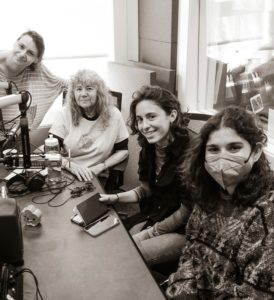
“No More Tears (Enough Is Enough),” Barbra Streisand and Donna Summer
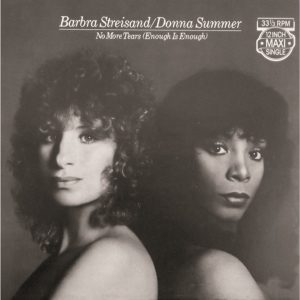
The Queen of Disco, the Queen of the Divas, and a balladic intro that blossoms into an ebullient dance hall beat — what more could you ask for?
When the 1979 Barbra Streisand-Donna Summer duet “No More Tears (Enough Is Enough)” came on in the WOMR studio as we recorded our International Women’s Day program, none of us could resist bouncing in our seats. Recorded when both were at the peak of their powers, Streisand and Summer trade irresistibly dramatic laments about their boring love lives. But then the instrumental shifts, and “enough is enough” for these peerless divas as the song crescendos to a triumphant cry of exasperation with small-fry suitors vying for their hearts.
Though it’s not often considered one, I have always thought of “No More Tears” as a feminist classic, a manifesto of sisterhood and resistance delivered in a mainstream pop package. In an industry that so often pitted its female stars against each other, this chart-topping duet paved the way for the collaborations of the 1990s and 2000s that embraced “girl power” and ridiculed trifling men, from Brandy & Monica’s “The Boy Is Mine” to the all-star lineup of “Lady Marmalade.” To me, International Women’s Day represents not just a call for a more equitable world but a celebration of that future and a tribute to its seeds in the present. “No More Tears,” then, makes for a perfectly joyful soundtrack to our collective visioning. —Amelia Roth-Dishy
“1977,” Ana Tijoux
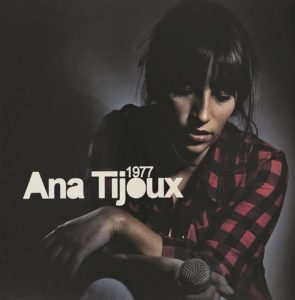
No matter where I am, I always hear this song blasting from a car stereo while I sit in the back seat with the windows down as city streets zoom by and leave me with snapshots.
“1977” is a masterpiece by French-Chilean pop/hip-hop artist Ana Tijoux, and it became a sonic staple for my family when we moved to Buenos Aires during my middle-school years. I was thrown into a new culture and language, so a lot of what I understood was ephemeral, and this song lands for me that way, too. Its serpentine sounds are punctuated by grand orchestral crescendos — or maybe that’s just me making it louder and louder, which I always do on impulse when I listen to it. For Tijoux, the 2010 hit marked a hard turn to hip-hop that helped launch her first North American tour. For me, it’s about excitement with no cause: until recently I didn’t know what the song was about. Words jumped out to me, but my attachment to the song was mainly affective. It turns out it’s a coming-of-age anthem after all, one that returns repeatedly to Tijoux’s birth in 1977 and acknowledges everything she’s gone through since.
In its own way, it is about the experience of the world zooming by outside your car window as you catch snippets of what’s moving past while being swallowed by feeling. —Sophie Mann-Shafir
“Off My Body,” SuperKnova
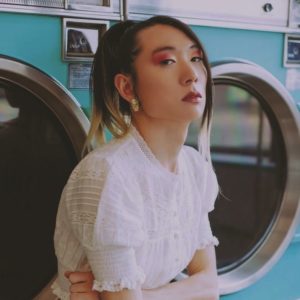
Sifting through my Spotify, I realized that my music collection is overwhelmingly female. I have my well-known staples (Gaga, Stevie Nicks, and Lizzo), but there’s another artist who made a lasting impression on me when I attended her Provincetown debut at the 2022 Washashore Festival last fall. SuperKnova (a.k.a. Ellie Kim) is a NYC-based Korean-American transgender musician who creates original pop music with drum machines, synthesizers, and electric guitar. Her music tells stories of identity, relationships and queerness, and navigating those realms in the larger contexts of our world.
When she performed at the Crown & Anchor with a Sonic Blue Fender Stratocaster, I was instantly captivated by her stage presence and innovative sound. Each song began with a driving beat, which she looped and layered live onstage. Her animated guitar solos commanded all the room’s energy as she shredded that Fender up, down, left, and right — even playing it behind her head for a spell. Her magnetic performance left me transfixed, gape-jawed, and misty-eyed. “Off My Body,” a song from her 2019 album American Queers, is a perfect anthem for this International Women’s Day, as an unprecedented amount of legislation targeting women and LGBTQ people are being introduced and advancing throughout the nation.
We need to uplift and amplify the voices and stories of our trans sisters and rally together as we fight for our collective rights of bodily autonomy and freedom from persecution for our expression of gender and sexuality. Belt it out with SuperKnova as she sings “I am divine, natural, made myself/ From the Earth, a woman’s work … So keep your laws off my body.” —Hannah Trott
“Vardø,” Hania Rani and Natalia Przybysz

International Women’s Day brings to mind memories from my childhood in Communist Poland.
It was an important holiday. Every girl and woman, young or old, would be handed red flowers from men — colleagues, supervisors, teachers, and other students. Occasionally, women would also get little gifts like tights, coffee, chocolates, or things that were hard to get at the time. One Polish song that captures this memory for me is “Vardø,” by two of my favorite artists who usually don’t perform together: pianist Hania Rani and singer Natalia Przybysz. It was recorded by MTV Unplugged and released in 2021.
The song is a melodic recitation of Polish female names. I enjoy that it’s in my native language — there is a power in the names that I find comforting. And in the end, both artists sing “All of them would dream in daylight.” —Agata Storer
“This Land Is Your Land,” Sharon Jones and the Dap-Kings
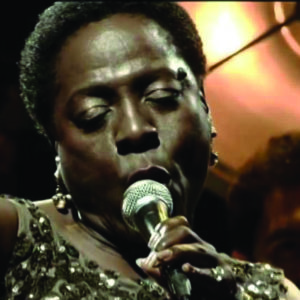
In the 1980s, when I was living in Spain, I met my New York cousin Julia in my hometown, Oklahoma City. We had fun making those family visits together. Her strange accent and her panic when the worker at the Humpty Dumpty counter picked up our bag of groceries to carry them out to our car inspired him to ask, “What country are y’all from?”
The straightforward innocence of his question comes to mind when conversations turn to how different Americans’ realities seem to be from one place to another. My home country, if I’m going to name it in this International Women’s Week, is one called Oklahoma. And Woody Guthrie is that land’s musician.
The version of “This Land Is Your Land” we sang in fifth grade wasn’t the same as the one Guthrie wrote in New York in 1940. It omitted the verse about running into private property signs and hungry people — we would have to learn those verses on the sly in high school. Still, it turned America into a place “to roam and ramble” on a “ribbon of highway” and our everyday landscape into something golden and glorious: “When the sun come shining, and I was strolling/ And the wheat fields waving and the dust clouds rolling/ A voice was chanting, as the fog was lifting/ This land was made for you and me.”
I never thought of Guthrie’s music as a man’s or a woman’s — though come to think of it, his free wanderings, as an Okie and then as a musician, were surely enabled by his gender. Women, however, have offered some of the most thrilling proof that “This Land” is a song that endures. Odetta covered it in 1970. Lady Gaga put a riff in her Superbowl LI mix in 2017. Then JLo took it to the inauguration in 2021.
Listen to Sharon Jones, who gave it fierce funk in 2004, and sing along to the ideal and essential marriage of patriotism and criticism of America that makes democracy possible. —Teresa Parker



